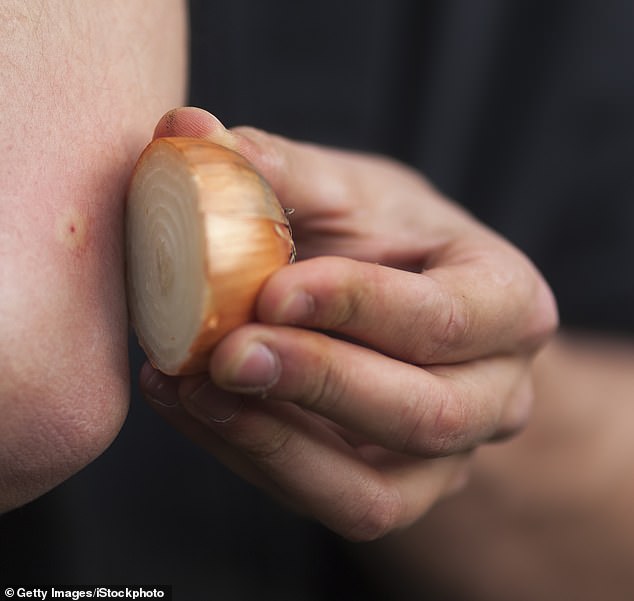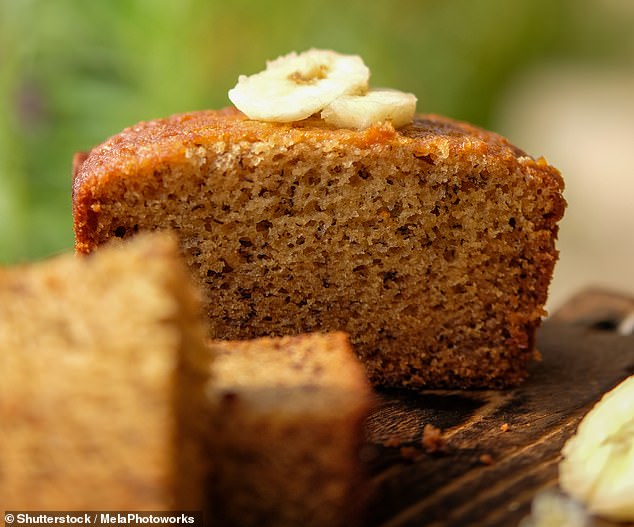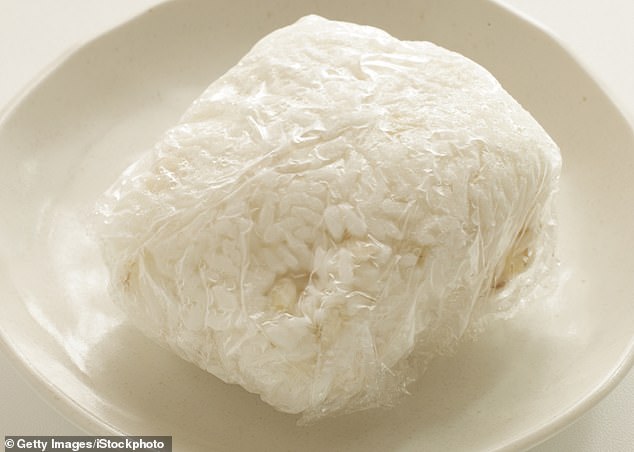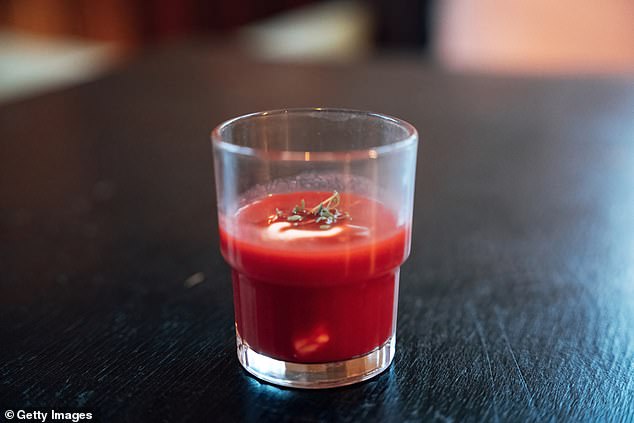
The heatwave has got us all feeling hot, bothered and craving the most effective ways to keep cool.
And while we might think we know all the obvious strategies to staying chilled, it turns out there are still a few scientifically proven tricks to try.
From rubbing raw onion on your skin to gargling toothpaste and rolling your tongue, SARAH RAINEY discovers some extraordinary ways to beat the heat . . .
WEAR WOOLLIES IN BED




Wearing marino wool in bed apparently draws sweat away from your skin, leaving you cooler than sleeping naked
Putting on anything woollen in a heatwave might seem like madness, but Dr Nicolas Berger, senior lecturer in exercise physiology at Teesside University, believes it could hold the secret to staying cool at night.
While sleeping in the nude might seem logical during extreme temperatures, scientists say it could make you hotter. As you’re not moving much at night, sweat collects on the body and stays there.
Dr Berger argues instead for merino wool.
‘It sounds warm,’ he says, ‘but it’s actually incredibly cooling.’
The fine, lightweight fibres in the fabric are layered; the inner layer draws sweat away from the skin and transfers it to the outer layer, where it can evaporate off into the air.
RUB ONIONS ON YOUR SKIN






Onions can help take heat and sweat away from your skin – and red onions can also help with sunstroke or sunburn
This isn’t because stinking of onions is an effective way to repel other people and their unwelcome body heat. Actually, onions have a long-running association with hot weather.
‘In rural India, they will cut an onion in half and rub the juice on the skin,’ explains Oxford professor Russell Foster.
Onions contain volatile oils (mainly sulphur-based) which evaporate when exposed to the air. Cutting into the onion exposes the oil — and, if this is then rubbed on the skin, it will help wick heat and sweat from the body and consequently lower your temperature.
Red onions also contain a compound called quercetin, which acts as an antihistamine; meaning the juice is effective in treating both sunstroke and sunburn.
GARGLE WITH TOOTHPASTE






Menthol is also used by top athletes, as it sends a signal to the brain telling it you feel cooler – and it smells much more refreshing than onions!
Dr Berger says menthol — from menthol drinks to chewing gum and toothpaste — can make us feel cooler in hot weather.
‘In extreme heat, athletes swill menthol around their mouths and spit it out,’ he explains. ‘Anything minty works, like gargling toothpaste and water.
‘It doesn’t change your temperature but it sends a signal to your brain — called a thermal sensation — telling it that you feel colder. It’s incredibly refreshing.’
You can also apply it topically to the body, he adds but high-concentration menthol (such as Olbas oil) can irritate the skin in the sunshine and smearing yourself in toothpaste doesn’t sound appealing. Though it might counter the smell of onions!
BAKE BANANA BREAD






Not only are bananas made up of 74 per cent water, which keeps you hydrated, they’re rich in potassium.
Now’s the time to revisit those banana bread baking skills you honed during lockdown.
Not only are bananas made up of 74 per cent water, which keeps you hydrated, they’re rich in potassium.
Sweat contains electrolytes, including potassium, so eating banana will help replenish bodily fluids and potassium.
Better still, put some poppy seeds in your banana bread. These are packed full of antioxidants and anti-inflammatories, which have been shown to quench thirst and cool the body.
CHILL YOUR MAKE-UP
Try chilling the contents of your make-up bag for a heat-proof beauty regime.
Much like splashing cold water on your face, cool cosmetics can improve circulation, help reduce redness by shrinking blood vessels and tighten pores (which in turn makes bacteria build-up — and break-outs — less likely).
ROLL YOUR TONGUE






If you can roll your tongue, then this trick is for you – but if you can’t you’ll have to forgo this particular tip
Tongue-rolling originates in yoga and meditation, and advocates say it’s like an air conditioner for the head and neck.
To try it, curl both sides of your tongue upwards to make a ‘U’ shape. Stick the end out between pursed lips and inhale slowly through the tube formed by your tongue, as if you were sucking air through a straw.
If it helps, pinch your nose. Hold your breath in for a few seconds, close your mouth and exhale slowly through your nose.
Do this five to ten times and you’ll notice an immediate cooling effect.
Although it’s not grounded in science, it is a form of what’s known as ‘nasal breathing’ — and a study in the journal Evolutionary Psychology found this to be effective in regulating the temperature of the brain.
The downside? Not everyone can roll their tongue.
FREEZE A ‘RICE SOCK’






Unlike ice packs, which can melt very quickly, rice and other grains can hold their temperature for longer once frozen
As the mercury rises, ordinary ice packs simply can’t handle the heat and will quickly turn to mush.
Instead, try freezing rice or other uncooked grains inside a sock, pair of tights or pillowcase.
The rice will hold its temperature for 30-40 minutes. Experts suggest sleeping with one on the back of your neck, or putting a few DIY ice packs between your sheet and mattress to cool the bed.
SPRAY ON GREEN TEA
Forget expensive facial mists: stew a green tea bag in some lukewarm water for a few minutes, transfer it to a spray bottle and spritz it on your face every two to three hours.
Green tea contains vitamin E which hydrates and stimulates your circulation: both will stop you feeling hot and sweaty.
GLORY IN GAZPACHO






Made primarily of tomatoes, which are 95 per cent water, gazpacho also contains cucumber (96 per cent water) and peppers (92 per cent water)
Soup may not be top of your menu this week, but gazpacho, a chilled Spanish soup (pictured below left), is one of the most hydrating dishes you can eat in a heatwave. Made primarily of tomatoes, which are 95 per cent water, it also contains cucumber (96 per cent water) and peppers (92 per cent water), so it’s basically a refreshing drink.
What’s more, tomatoes are a rich source of a naturally occurring carotenoid called lycopene, which was shown in a series of studies from 2005 to 2010 to protect the skin from sunlight and reduce redness after sunbathing.
BAN BARBECUES
This isn’t because standing next to a hot BBQ will make you sweat but because meat-heavy meals are a bad idea in a heatwave.
It takes a significant amount of digestive power to process protein — such as red meat and cheese —in the body. Digestion creates heat in a process known as thermogenesis; this heat makes the body warmer from the inside out.
It can take up to 100 per cent more energy to break down protein than carbohydrate, so steer clear of that cheeseburger.
If you can’t resist firing up the grill, try cooking healthier, carb-rich sweetcorn, sweet potatoes or cauliflower instead.
SOAK YOUR CURTAINS
If you don’t have air conditioning, trying cooling the air by soaking the ends of your curtains — as long as they’re made of washable material — in cold water. Then throw open the windows, draw the curtains and wait for the temperature inside to drop.
In a hot environment, the water will travel up the fabric as it starts to evaporate. Any breeze (here’s hoping) coming in from outside will cool as it passes through the damp fabric, wafting into the room.
Closing the curtains will also stop the sun from shining directly into the room; a must if you have leather sofas or a glass table which absorb heat.
SWITCH TO PEARLS
If you’re spending time in the hot midday sun, ditch metal necklaces, bracelets and earrings. These absorb heat and conduct it straight on to your skin. Silver is worse than gold as it’s a better conductor.
Instead, accessorise with pearls, but real ones, not plastic fakes. Real pearls, made of organic matter, are always cool to the touch.
DON’T EAT MANGOES
Tropical fruits might be appealing on a hot day, but mangos are diuretics — meaning they make you need to urinate more often — and should be avoided as they remove water from the body and could leave you dehydrated.
The same applies to asparagus, fennel and artichokes, frequently found in summery salads.
Mangoes are also high in sugar, and generate heat in the body during the digestive process.
Fans, however, say there’s an easy way to combat this. Soaking the flesh in water before eating it reduces the fruit’s thermogenic properties and makes them easier (and cooler) to digest.